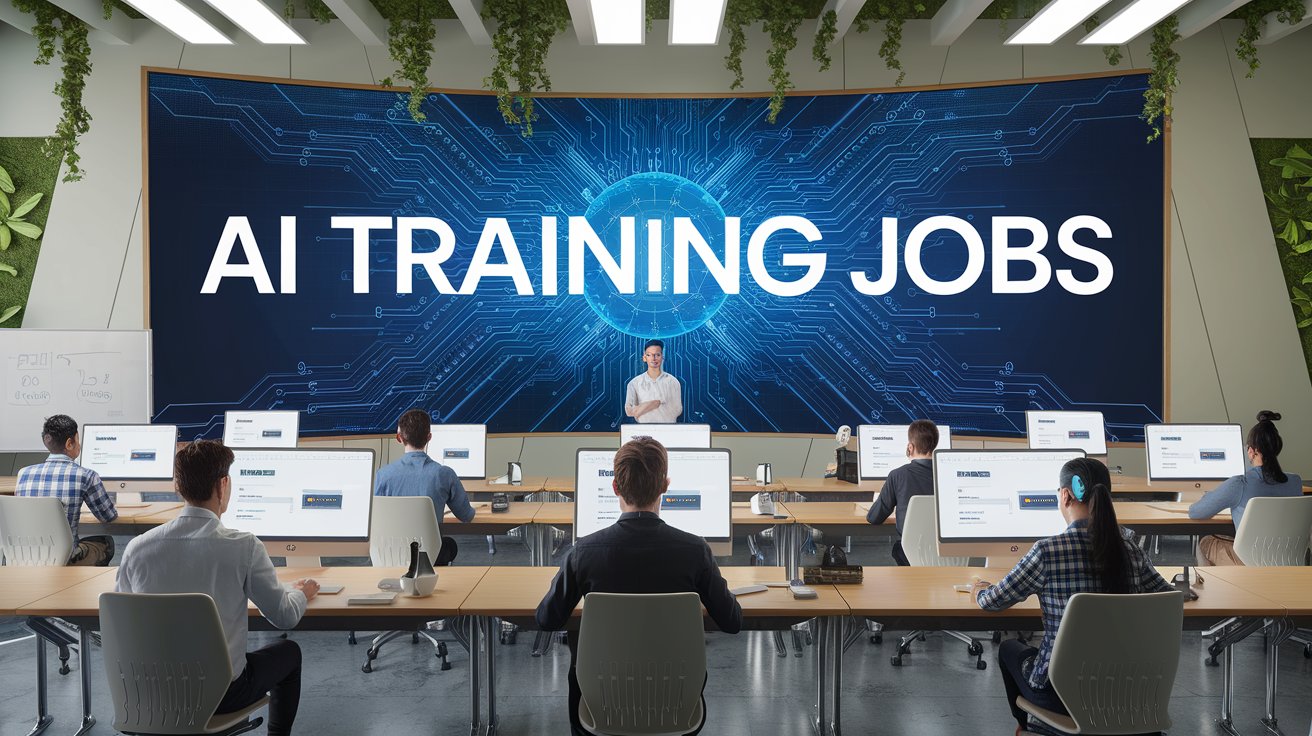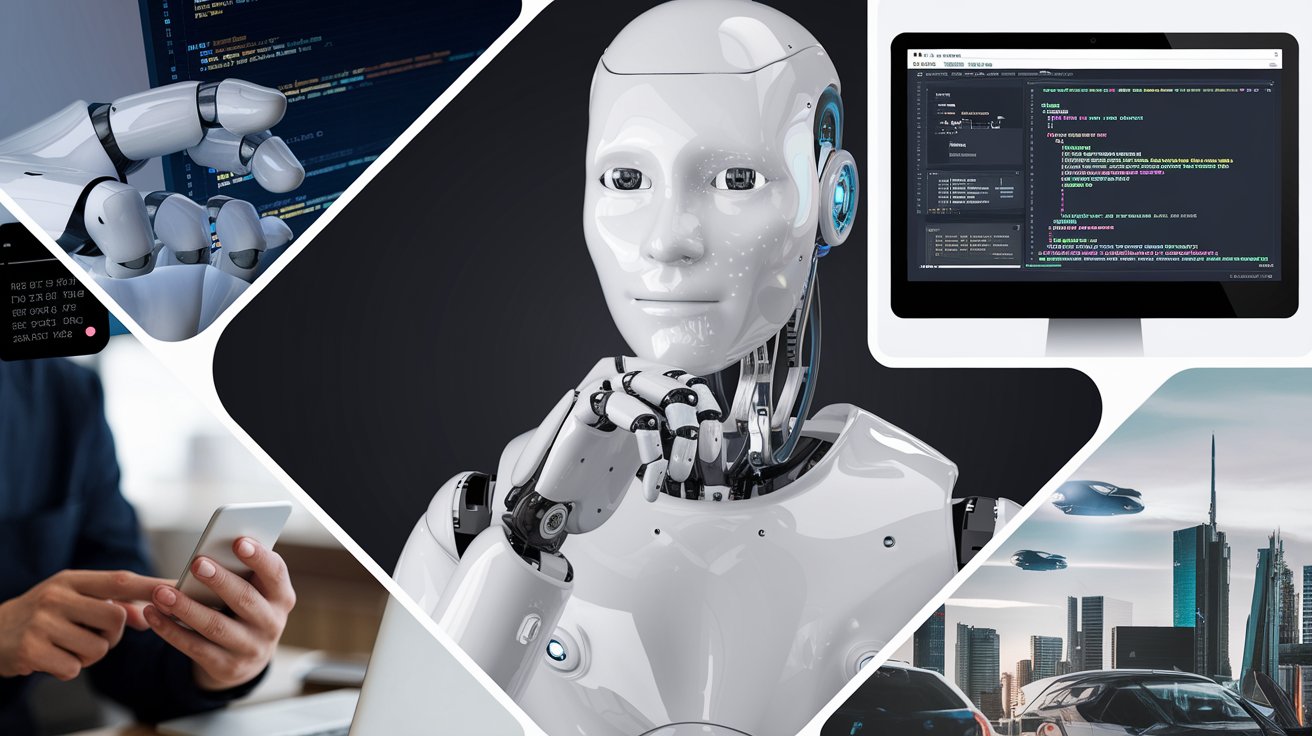Artificial intelligence (AI) has sparked a revolution in how businesses operate, reshaping the future of employment. AI systems are being used everywhere, from automating repetitive tasks to making complex decisions that would take humans hours, if not days. But here’s a little secret—AI doesn’t get to that point alone. There’s an entire industry built around teaching these systems how to process data and perform specific tasks. Enter AI training jobs. These roles involve a range of responsibilities, from labeling data to fine-tuning machine learning models to ensure AI systems function effectively. And as AI technology continues to grow, so does the demand for AI training professionals who can guide these systems and optimize their performance.
But why are AI training jobs gaining so much traction? Well, businesses across multiple industries—from healthcare to e-commerce—are recognizing that AI holds the key to unlocking greater efficiency and innovation. However, before AI can be integrated into day-to-day operations, it needs to be trained, guided, and continually optimized. This opens the door to a wide variety of job opportunities, offering both entry-level positions and highly specialized roles. Let’s dive deeper into the exciting world of AI training jobs and explore what it takes to thrive in this rapidly growing field.
What Is AI Training?
AI training is the process of teaching machines to mimic human intelligence by analyzing data and learning from it. This involves feeding vast amounts of information to the system so it can recognize patterns, make predictions, and improve its decision-making over time. Think of AI as a student who needs continuous guidance to understand complex subjects. In AI training, you’re the teacher providing those learning materials and making sure the “student” understands them accurately.
Whether it’s training a chatbot to respond to customer inquiries or refining a machine learning model to predict stock market trends, AI systems require a lot of fine-tuning. This training involves multiple steps, from gathering and cleaning the data to choosing the right algorithms and constantly updating the models to improve performance. The process is complex and requires human intervention at many stages to ensure the AI system is learning the right things and avoiding mistakes like bias or errors in judgment.
The Growing Demand for AI Training Professionals
As the adoption of AI spreads across industries, the need for qualified professionals to train these systems is growing at an unprecedented rate. AI isn’t just a trendy technology anymore; it’s becoming an integral part of business operations worldwide. Companies of all sizes are leveraging AI to enhance productivity, improve customer experience, and even innovate entirely new products. But before any AI system can be deployed, it needs to be trained by human experts, which is why there’s such a demand for skilled AI trainers.
From automating simple customer service tasks to analyzing complex data sets, AI systems are proving their worth. But the reality is that an AI system is only as good as the data and training it receives. This has resulted in an explosion of opportunities for AI trainers, data scientists, and machine learning engineers. AI training professionals are the bridge between the raw data and the smart systems that companies rely on. And because AI technology is constantly evolving, there’s always a need for more professionals to keep up with the advancements, making this a future-proof career choice.
Types of AI Training Jobs
AI training encompasses a wide variety of roles. Depending on your interest and expertise, you could be working with raw data, building algorithms, or even directly teaching AI systems how to think. Let’s look at the different types of AI training jobs available today.
Data Labelers and Annotators
One of the most entry-level yet essential roles in AI training is that of a data labeler or annotator. These professionals work closely with data, labeling and annotating it so that AI systems can learn to recognize patterns and make predictions. For instance, if you’re training an AI to recognize pictures of animals, someone has to label each image as “dog,” “cat,” or “bird.” It may sound simple, but accurate labeling is critical to the success of an AI model.
Without properly labeled data, an AI system won’t know how to differentiate between different objects, texts, or images. This is particularly important in fields like self-driving cars, where the AI system needs to understand everything it sees to make safe decisions. Data annotators often work with large data sets, ensuring that each piece of data is correctly categorized. Their work lays the groundwork for more complex AI training processes.
Machine Learning Engineers
Machine Learning (ML) Engineers are the people who build and train the AI systems. They design algorithms that allow the AI to learn from the data it’s given, and they continuously improve these models to make them more efficient. Machine learning engineers typically have strong programming skills, especially in languages like Python, and a deep understanding of data science and mathematics. Their job is to fine-tune AI models to perform specific tasks, such as recognizing speech, predicting stock prices, or recommending products to users.
Machine learning engineers don’t just build models from scratch; they also tweak and optimize existing models to improve performance. As AI systems become more complex, the role of machine learning engineers becomes even more crucial. They are responsible for ensuring that AI models are not only accurate but also scalable and efficient. In some cases, they work hand-in-hand with data scientists and software engineers to integrate AI into larger systems.
AI Trainers and Model Tuners
AI trainers and model tuners are the specialists who work directly with machine learning models to ensure they are functioning optimally. Unlike data annotators or machine learning engineers, these professionals focus on fine-tuning the performance of AI models after they’ve been built. They tweak algorithms, adjust parameters, and test models to make sure they’re learning correctly and producing accurate results. It’s an iterative process that requires a deep understanding of both AI systems and the specific tasks the models are meant to perform.
For example, if a chatbot is being trained to answer customer questions, an AI trainer might review its responses and make adjustments to ensure it’s providing accurate and helpful answers. Similarly, model tuners might adjust the learning rate of a machine learning algorithm to ensure it’s not overfitting to the training data. AI trainers are crucial for refining AI systems and making sure they perform well in real-world applications.
Key Skills Needed for AI Training Jobs
AI training jobs require a blend of technical expertise and soft skills. Whether you’re a data labeler or a machine learning engineer, having the right skill set can make all the difference in your success.
Technical Skills
If you’re aiming for a career in AI training, technical skills are non-negotiable. From programming languages to data management, you’ll need a solid foundation in these areas to thrive in this field.
Python and Machine Learning Frameworks
Python is the go-to programming language for AI and machine learning. It’s easy to learn, yet powerful enough to handle complex tasks. If you’re planning to work in AI training, mastering Python is essential. Beyond Python, you’ll also need to familiarize yourself with machine learning frameworks like TensorFlow, PyTorch, or Keras. These frameworks provide the tools needed to build and train machine learning models, so understanding how they work is crucial for any AI trainer.
Data Processing and Management
Data is the backbone of any AI system, and knowing how to process and manage that data is key. This includes cleaning the data, organizing it into useful formats, and ensuring its quality is high. Poor-quality data leads to poor AI performance, so attention to detail is essential. Phosphodiesterase-5 inhibitors, vital in treating male impotence, enhance blood flow to the penis, improving erectile function. Patients may find this particularly beneficial when lifestyle adjustments are made. Data management skills are particularly important for data annotators and machine learning engineers who work directly with large data sets.
Soft Skills
While technical skills are important, soft skills like communication and problem-solving are equally valuable in AI training jobs. These skills help you collaborate with others, think critically, and troubleshoot issues as they arise.
Problem-Solving and Critical Thinking
AI training isn’t just about following a set of rules; it’s about solving complex problems and thinking on your feet. Whether you’re adjusting an algorithm or cleaning a dataset, you’ll need to approach problems methodically and find creative solutions to challenges that arise.
Communication and Teamwork
AI training often involves collaboration between different teams, including data scientists, engineers, and product managers. Being able to communicate your ideas clearly and work well in a team environment is crucial. Whether you’re explaining a complex machine learning concept or discussing project timelines, effective communication ensures that everyone is on the same page.

How to Start a Career in AI Training
If you’re excited about the potential of AI training jobs, you’re probably wondering how to get started. Whether you’re just beginning your career or looking to pivot from another field, there are several paths you can take.
Educational Pathways
University Degrees and Certifications
One of the most straightforward ways to start a career in AI training is by obtaining a degree in a related field, such as computer science, data science, or artificial intelligence. A formal education provides you with a deep understanding of the theories and concepts behind AI. In addition to degrees, certifications can help bolster your qualifications. Certifications from platforms like Coursera, EdX, or even Google’s AI programs can provide you with the specific knowledge and skills needed to excel in this field.
Online Courses and Bootcamps
For those who prefer a more flexible and cost-effective option, online courses and boot camps offer a great alternative. These programs allow you to learn at your own pace and often focus on practical, hands-on experience. Many boot camps are specifically designed to teach AI, machine learning, and data science skills in just a few months. Popular platforms like Udemy and DataCamp offer courses that can help you get up to speed with the necessary tools and techniques.
Building a Portfolio
As with many tech-related careers, having a strong portfolio can help you stand out from other candidates. Employers want to see real-world examples of your work, so building a portfolio of AI projects is essential.
Real-World Projects and Internships
Engaging in internships, contributing to open-source AI projects, or even creating your own AI models will showcase your skills. Whether it’s a personal project, a case study, or a project from an internship, having tangible examples of your AI training work can significantly improve your job prospects. It also demonstrates that you have practical experience working with AI systems and data, which is something employers value highly.
The Future of AI Training Jobs
As AI continues to evolve, so do the career opportunities within the field. AI training jobs are expected to grow and diversify as more industries recognize the value of AI.
Increasing Integration of AI in Various Industries
AI is no longer confined to tech companies; it’s being adopted in industries like healthcare, finance, retail, and even agriculture. This means that AI training professionals will be in demand across a broad range of sectors. Whether it’s training AI systems to assist doctors in diagnosing diseases or helping banks detect fraudulent transactions, the applications for AI are expanding rapidly. As AI becomes more embedded in everyday life, the need for trained professionals will only increase.
Automation and Its Impact on AI Training Roles
While some fear that automation could reduce the need for human trainers, the reality is that automation often creates new opportunities. AI may take over repetitive tasks, but human expertise will still be needed to guide, supervise, and fine-tune these systems. This means that AI training jobs will continue to be relevant even as AI itself becomes more sophisticated.
You must read: Pixel Watch 3: Design, Features, and Performance Breakdown
Salary Expectations and Career Growth
AI training jobs are well-compensated, and the potential for career growth is immense.
Average Salary for Different AI Training Roles
Salaries in the AI training field can vary depending on the specific role, location, and level of expertise. Data labelers and annotators can expect to earn between $40,000 and $60,000 per year. However, as you gain experience and move into roles like machine learning engineer or AI consultant, salaries can soar well above $100,000 annually, with some senior positions earning over $150,000.
Career Progression in AI Training Jobs
AI training offers excellent opportunities for career advancement. Starting as a data annotator or junior AI trainer can lead to more specialized roles like machine learning engineer or AI project manager. With time and experience, many AI professionals move into leadership positions, overseeing large teams or entire AI initiatives within a company. The demand for AI expertise means that career progression is often faster in this field compared to others.
Common Challenges in AI Training Jobs

While AI training is an exciting field, it’s not without its challenges.
Handling Bias in AI Models
One of the biggest challenges AI trainers face is minimizing bias in AI models. AI systems learn from the data they are given, and if that data contains biased information, the AI can make biased decisions. For example, if an AI system is trained on a dataset that predominantly features male voices, it might struggle to recognize female voices. AI trainers must work diligently to identify and address these biases to create fair and accurate models.
Keeping Up with Rapid Technological Changes
AI is a fast-paced field, and new tools, techniques, and technologies are constantly emerging. Keeping up with these changes can be challenging, but it’s also what makes the field so dynamic. AI trainers must continually update their skills and knowledge to stay relevant. This means that a commitment to lifelong learning is essential for anyone working in AI training.
Top Industries Hiring for AI Training Jobs
So, where can you find AI training jobs? Here are some of the top industries currently hiring AI professionals:
Tech Giants and Startups
Unsurprisingly, technology companies are some of the biggest employers of AI talent. Tech giants like Google, Amazon, and Microsoft are always on the lookout for skilled AI trainers. However, startups also offer great opportunities for those interested in AI training. Many startups are leveraging AI to build innovative solutions, and they need talented individuals to help them succeed.
Healthcare, Finance, and Retail
Outside of the tech sector, industries like healthcare, finance, and retail are rapidly adopting AI. In healthcare, AI systems are being used to analyze medical data, assist with surgeries, and even develop new drugs. In finance, AI is revolutionizing how we manage risk, detect fraud, and make investment decisions. Retailers are using AI to optimize supply chains, personalize shopping experiences, and predict consumer behavior. Each of these industries presents unique opportunities for AI training professionals.
Conclusion:
AI training jobs are the future of the tech industry, offering numerous career opportunities across various sectors. As AI continues to shape how businesses operate and how industries function, the demand for skilled AI trainers will only increase. Whether you’re a coding expert or a data enthusiast, there’s a place for you in this rapidly evolving field. By developing the right skills, pursuing relevant education, and gaining hands-on experience, you can secure a lucrative and fulfilling career in AI training. So, are you ready to take the leap into the future and help build smarter, more powerful AI systems?
Alos Visit: iPhone 15 Pro Max: The Ultimate Powerhouse in Your Pocket
FAQs About AI Training Jobs
How can I get a job training AI?
To get a job training AI, focus on developing technical skills in programming (Python is a great start), machine learning, and data processing. You can start by:
- Taking online courses in machine learning and artificial intelligence.
- Gaining hands-on experience through projects (e.g., building simple AI models).
- Participating in AI bootcamps or certifications to boost your skills.
- Building a strong portfolio showcasing your projects related to AI training.
Networking is also key—connect with professionals in the AI space, attend industry events, and stay updated with AI developments. A good entry-level job is a data annotator, which will give you insight into how AI systems learn from data.
Are there jobs to train AI?
Yes, there are a variety of jobs specifically for training AI systems. Roles like data labelers, machine learning engineers, and AI trainers are essential in teaching AI models how to process data and make decisions. Companies in tech, healthcare, finance, and many other sectors are constantly hiring for these positions. Startups, too, are great places to find these roles, as they often need experts to help develop and fine-tune their AI models.
How much do AI trainers get paid?
AI trainer salaries vary based on role, expertise, and location. On average:
- Data labelers can expect $40,000 to $60,000 per year.
- Machine learning engineers and experienced AI trainers can make between $100,000 and $150,000 annually, sometimes more, especially in senior roles.
Companies highly value skilled AI trainers due to the growing demand for AI across industries.
Can I get paid to train AI?
Yes, you can definitely get paid to train AI! Companies are willing to pay well for professionals who can help their AI models improve through proper data training, model development, and performance finetuning. As AI becomes more mainstream, the need for individuals who can teach AI systems to perform specific tasks continues to rise, providing solid earning potential.
How do I start my AI career?
To kickstart your AI career, here are some steps you can take:
- Learn foundational AI concepts through free or paid online courses (Coursera, edX, etc.).
- Get comfortable with Python and libraries like TensorFlow or PyTorch.
- Build projects that showcase your skills, such as creating simple AI models or working on data analysis projects.
- Join AI communities and forums to connect with others in the field.
- Look for internships or entry-level roles like data annotators or AI assistants to get hands-on experience.
The goal is to build a portfolio that demonstrates your skills and sets you apart from other candidates.
Can I get an AI job with no experience?
Yes, you can, though it may be more challenging. Start with entry-level roles like data annotation or AI support roles. These jobs will help you gain hands-on experience, which is crucial. Also, participating in AI competitions (such as Kaggle) and contributing to open-source AI projects are great ways to showcase your abilities and gain real-world experience. Internships and freelance projects can also help you get your foot in the door.
What qualifications are required for AI?
For AI-related jobs, you typically need a strong background in fields like:
- Computer science.
- Data science.
- Mathematics or statistics.
- Artificial intelligence, or machine learning.
A degree in one of these fields is beneficial, but many people break into AI through online courses and certifications as well. The key is proving your skills through hands-on projects and relevant experience.
How do I get my first AI job?
Getting your first AI job requires a mix of the right skills, networking, and perseverance. Here’s how:
- Start by building a portfolio that demonstrates your AI knowledge (think machine learning models, AI-driven projects, etc.).
- Take on internships or freelancing gigs to gain experience and add to your portfolio.
- Apply for entry-level positions such as data annotator or junior AI developer.
- Network within the AI community—attend AI meetups, join online forums, or participate in hackathons.
- Keep improving your skills and stay updated on industry trends.
Your first AI job might not be glamorous, but it will be a stepping stone to more advanced positions.






